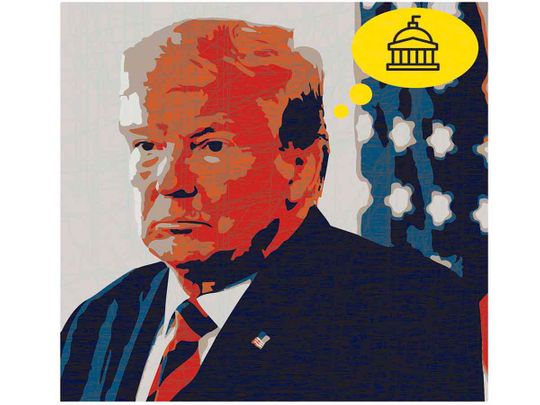
In the days immediately following the 2020 election, President Donald Trump should have known that he was not going to win.
I mean that in a literal sense: Trump should have understood that the pattern of vote-counting in enough states showed that he would fall behind Joe Biden’s totals and never catch up. In fact, Trump was told this by one of his campaign’s data experts, as his aide Jason Miller told the House select committee investigating the US Capitol riot.
Trump should have known that this wasn’t weird or conspiratorial, since there was plenty of reporting on the way in which vote-counting would unfold. He should have been aware that his polarising presidency would inspire as many people to vote for Biden as it did to vote for him.
All of that was sitting out there for objective observers to consider. Trump wanted to win and hoped he’d win, and then he didn’t. The truth of the matter was that he lost.
But it’s not clear whether Trump recognised that truth. He has given little indication that he did, insisting without pause since November 2020 that the election was stolen from him. Even when that data expert explained that he had no path to victory, Miller claims, Trump objected, arguing that he was “looking at purely from what those numbers were showing as opposed to broader things to include legality and election integrity.”
Truth of the matter
There was the truth of the matter ... and then there was Trump’s way of considering that truth. The numbers said he wouldn’t win, but what about the court challenges? Then the court challenges failed, so the “what about” shifted: What about various noncredible claims about fraud? What about the court’s failure to do its job? Wasn’t the truth clearly subject to further exploration?
Since Trump first came down the escalator seven years ago next week, the question of truth has been of enormous importance in American politics. His candidacy and presidency elevated the salience of simply acknowledging what was real, and his presidency culminated in a violent effort to supplant reality with falsehoods.
Since the election, Trump’s claims about the result have been labelled “the big lie.” So not every Trump supporter is lying about the election results: Many of them sincerely believe that the election was stolen. They believe what Trump and his allies in the conservative media said about fraud and about the trickiness of encouraging more people to vote.
You can see how the verbiage very quickly stops mattering beyond being a thought experiment for future sophomore-level philosophy courses. What matters is that Trump has spread misinformation about the election without pause since only a few hours after it ended and that millions of Americans believed him.
That’s what struck me, watching the video footage of violence at the Capitol aired during the House committee’s hearing on Thursday night: thousands of people absolutely furious about what they saw as an election that had been stolen — because people they believed were telling them the truth insisted it had been.
This, in fact, was the argument made by Fox News’s Tucker Carlson as he worked to distract the network’s viewers from the committee’s findings: Those people were furious because they thought the election was stolen. He meant this as a way to exonerate the rioters and others at the scene, but what he did instead was indict himself and Trump.
He was among those who tried to elevate questions about the legitimacy of the election (as he did on Thursday, as well). The rioters were motivated by a belief that they thought was true, so, therefore, it’s the people who fostered that false belief who are culpable for what followed.
What’s crucially important is that there’s been no effort since Jan. 6 to correct that belief. For a few hours or days in the wake of the riot, outer-ring Trump allies appeared to waver, expressing some concern about what the president had been doing and saying.
Political and emotional cost
But the political and emotional cost of challenging that belief was too high and the rewards of catering to it large enough that the effort quickly collapsed. Trump was muffled by his removal from social media but he and his team have nonetheless pressed forward, backing and amplifying a scattershot campaign of sowing doubt about the election results, more than a third of the way into President Biden’s term.
The only factor that isn’t in place now that was in place on Jan. 6 is a reason for thousands of angry people to be in the same place at the same time.
Trump, of course, never backed away from his claims about the election. Maybe he believes it, as defence attorneys might one day try to argue in a court of law. Perhaps he didn’t or doesn’t, as other advisers have asserted and as seems most likely to be the case. But for us it doesn’t matter.
What matters is he keeps pressing the case, keeps elevating assertions that his supporters continue to accept as true. Even in the wake of the House hearing, Trump was adding threads, disparaging even his own daughter as not knowing what she was talking about as she accepted the truth of Trump’s election loss.
His conduit for sharing those thoughts was the Twitter clone he helped launch earlier this year, named Truth Social. Posts on the network are called “truths,” even the false ones.
Washington Post
Philip Bump is a prominent American journalist. He is presently writing a book about the baby boom





